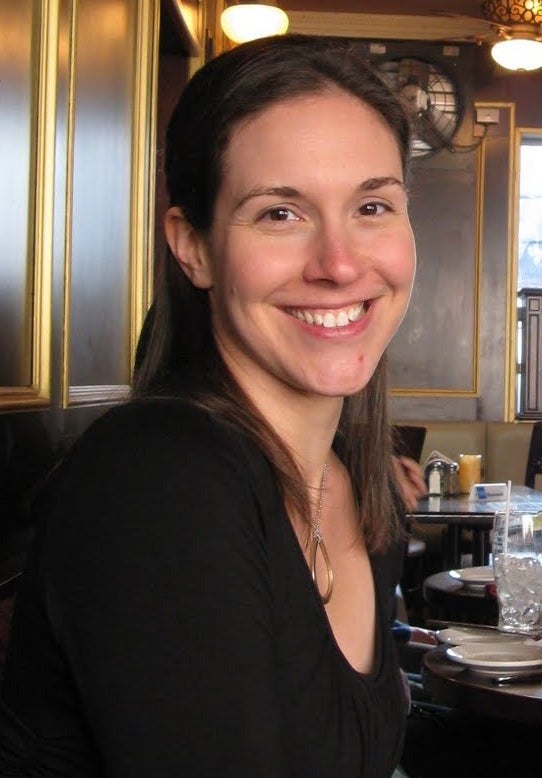Editor:
Brandon Sweet
University Communications
bulletin@uwaterloo.ca
New tree of life may hold clues to cleaning up pollution

by Victoria Van Cappellen
A new University of Waterloo professor who was part of a research team that discovered 1,000 new microorganisms, is hoping the team’s revised “tree of life” will hold clues to cleaning up environmental contamination.
Biology professor Laura Hug, who joined the Waterloo’s Faculty of Science in January, was a postdoctoral fellow with Jill Banfield, a professor of Earth and Planetary Science at the University of California Berkeley. Their new version of the tree of life was published recently in the journal Nature Microbiology.
Now, Hug plans to further her research on the diversity and function of new microorganisms to clean up pollution. One of her projects includes investigating microbial communities found at landfill sites, which are currently understudied.
“Contaminated sites are extreme environments with microbial communities that have adapted to these harsh conditions, and whose members are often able to degrade the contaminants,” says Hug. “This new tree highlights how much microbial diversity is still uncharacterized, including organisms with activities we can use for remediation.”
The research Hug did with the Berkeley team involved using a smaller sized filter to target tiny, previously overlooked bacteria. Hug helped to apply advanced metagenomic analysis and customized genome binning to reconstruct whole genomes from nearly 800 species. Hug and Banfield teamed up with researchers from Texas, California and Japan to rework the tree of life by including all newly discovered genetic diversity.
Their tree of life contains more than 3,000 representative organisms, one from each genus for which fully or almost fully sequenced genomes were available. Nearly a third of these organisms are new and are known only from their genomes.
The result shows that about one-third of all biodiversity comes from bacteria, one-third from uncultivable bacteria, and a bit less than one-third from Archaea and eukaryotes.
“The [new] tree gives us a benchmark for life as we currently know it, and invites hypotheses into what we are still missing,” says Hug.
One of the largest branches to appear in the new tree is “candidate phyla radiation.” It includes nearly half of all bacterial evolutionary diversity, and researchers suspect these organisms are mostly symbionts, relying on other life forms to survive.
Not your ordinary residence experience

This is the latest in a series of #UWStratPlan stories that profile some of the initiatives that are part of the robust efforts to implement the Strategic Plan.
What happens when you gather together like-minded students, put a rigorous support system in place and get them ready for their first big step towards a career?
Success appears to be the answer. Most first-year engineering students who took part in the University of Waterloo’s Co-op Living-Learning Community pilot program reported coming out of the experience feeling ready and able to land a co-op position.
Preparation is the key.
"Students will spend more time in their residence than they will in the classroom, so there is a huge opportunity for a great deal of learning in that environment," says Alex Piticco, director, student development and residence life.
The pilot program involved 150 first-year engineering students housed in three buildings in the Village One residence complex. They were all on a similar track — four months of school, then off to co-op.
Students pack a lot of adjustment into the start of school in September, Piticco says: They settle into an unfamiliar place, straighten out their courses, buy their books and, very quickly, start thinking about a co-op work term for the winter term a few short months away.
What the Co-op Living-Learning Community does — and it fits the experiential education objectives of the University’s Strategic Plan — is pour a broad range of supportive services into that residence environment.
Read the rest of the story on the University of Waterloo Strategic Plan website.
Grads invent allergy patch, start company with $60K award
A skin patch the size of a quarter could make allergy testing safer, faster, and pain-free.
The Band-Aid like patch developed by two University of Waterloo alumni can be placed on the forearm to accurately detect allergies in 15 minutes without scratching, piercing, or irritating the skin.
The ExVivo patch, created under the startup ExVivo Labs, could revolutionize the allergy testing process by allowing consumers to buy patches at a pharmacy and conduct the pain-free test at home. If an allergy is detected, the results can be taken to a specialist for further diagnosis and treatment, similar to at-home pregnancy tests.
The development of the patch was funded in part by an AC JumpStart – University of Waterloo award. Funded by FedDev Ontario and delivered through the Accelerator Centre in partnership with University of Waterloo, AC JumpStart provides early stage technology startups with the seed capital, mentorship, and market-readiness tools needed to build a business in today’s knowledge economy. Alumni who earned their last Waterloo degree within five years and are interested in commercializing an innovation and starting a business can apply for AC JumpStart by May 9.
“When brainstorming about problems in healthcare we looked into allergy testing and were shocked at how traumatic and painful it can be, especially for children. We knew there had to be a better way than scratching and irritating the skin or drawing blood and waiting days for results,” says Moufeed Kaddoura, co-founder and CEO of ExVivo Labs. “The ExVivo patch makes allergy testing safe, simple, and certain for users, even though the technology behind the patch is anything but simple.”
Each patch uses patent protected technology to detect an allergy and will change colours to indicate if one is present. The technology was designed with children in mind and the team at ExVivo, including co-founder Eric Blondeel, hopes to launch a child-focused peanut patch in the near future.
Tuesday's notes
Stanley Cup champion, gold medal winner and author Theo Fleury will be visiting the Waterloo Accelerator Centre (AC) today. Mr. Fleury has recently signed on with AC client MyProHero to deliver his inspirational coaching message to youth through the MyProHero platform, and is visiting the AC to begin working with the MyProHero team to develop digital content.
The AC and MyProHero will be hosting a meet and greet with Mr. Fleury, giving local, UW and R+T Park fans the opportunity to connect with this NHL superstar and learn more about the MyProHero coaching platform. Fans are welcome to drop by the AC for a 12:30 presentation and meet and greet. Everyone is welcome.
Hungry? At the Bomber, there are two free apps for that. The Bombshelter Pub has a special promotion going on this week, where every table of 8 or more patrons will receive two free appetizers. I recommend the (sigh) 'hashtag fries'.
Links of the day
How to apologize: sincerely and insincerely
When and where
1000 Acts of Green campaign, Monday, March 28 to Friday, April 22.
Waterloo Global Science Initiative presents Power Shift Waterloo Region, Sunday, April 17 to Saturday, April 23.
Office of Research presents Waterloo Aerospace and Defence Research Forum, Tuesday, April 19, 8:30 a.m. to 3:30 p.m.
Conrad presents MBET Webinar, Tuesday, April 19, 10:30 a.m.
Ecohydrology Seminar by Nathan Basiliko, department of Biology, Laurentian University, “Bolstering bioenergy production in Canada's forestry sector: A soil's perspective,” Tuesday, April 19, 2:00 p.m., DC 1302.
Campus Life Fair, Wednesday, April 20, 11:00 a.m. to 2:00 p.m., Student Life Centre Great Hall.
Waterloo Institute for Complexity and Innovation Talk featuring Professor Tuomas Yla-Anttila, Helsinki Research Group for Political Sociology at the University of Helsinki, "Comparing Climate Change Policy Networks," Wednesday, April 20, 2:00 p.m., DC 1302.
Changing the Discourse: Energy Poverty at Home and Abroad, Wednesday, April 20, 7:00 p.m., Waterloo Public Library.
Earth Day, Friday, April 22.
Think About Math! workshop, Friday, April 22.
20 Minute Makeover campus tidy-up event, Friday, April 22, 12:00 p.m., EV2 1001.
Examinations end, Saturday, April 23.
Going 100% Renewable with Søren Hermansen, Saturday, April 23, 4:00 p.m., Perimeter Institute.
Waterloo Global Science Initiative (WGSI) OpenAccess Energy Summit, Sunday, April 24 to Wednesday, April 27.
Deadline for students to get "Fees Arranged," Monday, April 25.
Vision Science Graduate Research Conference, Monday, April 25 and Tuesday, April 26, 10:00 a.m., OPT 1129.
Science and Values in Peirce and Dewey: A Conference in Honour of Angus Kerr-Lawson, Monday, April 25 to Wednesday, April 27.
Mark Haslett retirement event, Tuesday, April 26, 3:30 p.m. to 5:30 p.m. RSVP by April 22 to Graham Yeates at ext. 32281 or gyeates@uwaterloo.ca.
Cultural Men and Natural Women? Gender and Development, Wednesday, April 27,9:30 a.m. to 4:30 p.m., Alumni Hall, St. Paul’s University College.
Water Institute Research Symposium 2016, Thursday, April 28.
Teaching and Learning Conference: OND 2016, Thursday, April 28, Hagey Hall.
Centre for Career Action staff panel, “You’re In Charge: Excel in Your Career at Waterloo,” Thursday, April 28, 12:00 p.m. to 1:30 p.m., DC 1351.
Water Institute RBC Distinguished Lecture 2016 by Jay Famiglietti, University of California Irvine, “Water and sustainability: 21st Century realities and the global groundwater crisis,” Thursday, April 28, 4:00 p.m., DC 1350.
WISE Public Lecture Series: Forensic Energy Management, Tuesday, May 3, 10:30 a.m., CPH 4333.
Alexander von Humboldt Fellowship and Research Support Information Session, Wednesday, May 4, 10:30 a.m., QNC 1501.
Centre for Teaching Excellence workshop, CTE759: Designing Teaching and Learning Research, Wednesday, May 4, 11:30 a.m. to 1:30 p.m., LIB 329.
Centre for Teaching Excellence workshop, CTE914: Teaching Dossiers and Philosophy Statements, Wednesday, May 5, 10:00 a.m. to 1:00 p.m., EV1-241.
Symposium on Aging Research, Friday, May 6, 8:00 a.m. to 4:30 p.m., DC 1301.
Feds Spring Welcome Week, Monday, May 9 to Friday, May 13.
Writing Centre workshop, "Clarity in Scientific Writing," Tuesday, May 10, 2:30 p.m. to 4:30 p.m.
Writing Centre workshop, "Getting Published," Wednesday, May 11, 12:30 p.m.
Clubs and Societies Days, Thursday, May 12 and Friday, May 13, 10:00 a.m. to 3:00 p.m., Student Life Centre Great Hall.
Writing Centre workshops, "Creating assertion-evidence presentations,"Thursday, May 12, 1:30 p.m.
Waterloo Unlimited Grade 10 - Change, Sunday, May 15 to Thursday, May 19.
Centre for Teaching Excellence workshop, CTE601: Instructional Skills Workshop (24 hours), Monday, May 16 to Wednesday, May 18, 8:30 a.m. to 4:30 p.m., EV1-241.
Writing Centre workshop, "Literature reviews for grads (Part A): Organizing research,"Monday, May 16, 11:30 a.m.
Senate meeting, Monday, May 16, 3:30 p.m., NH 3407.
Writing Centre workshop, "Say it in your own words: Paraphrase & summary," Tuesday, May 17, 10:30 a.m.
Belonging: Diversity, Community Capacity & Contribution - An Evening with The Right Honourable Adrienne Clarkson, Wednesday, May 25, 6:00 p.m., Humanities Theatre.
You @ Waterloo Day, Saturday, May 28, various locations on campus.
Undergraduate School on Experimental Quantum Information Processing (USEQIP), Monday, May 30 to Friday, June 10, Quantum-Nano Centre.
One click away
- Georgetown University confronts its slave-trading history
- Newfoundland's budget cuts $8M from Memorial University...
- ...while Alberta's budget leaves the PSE sector intact
- Business schools given roadmap to change
- Carleton's academic staff votes no confidence in board, senior staff
- U of Alberta's president has UK PSE envy
- University of Victoria pro-life student group loses court challenge
- Student residence clash at U of Alberta
- Waterloo research exposes the downsides to situps
